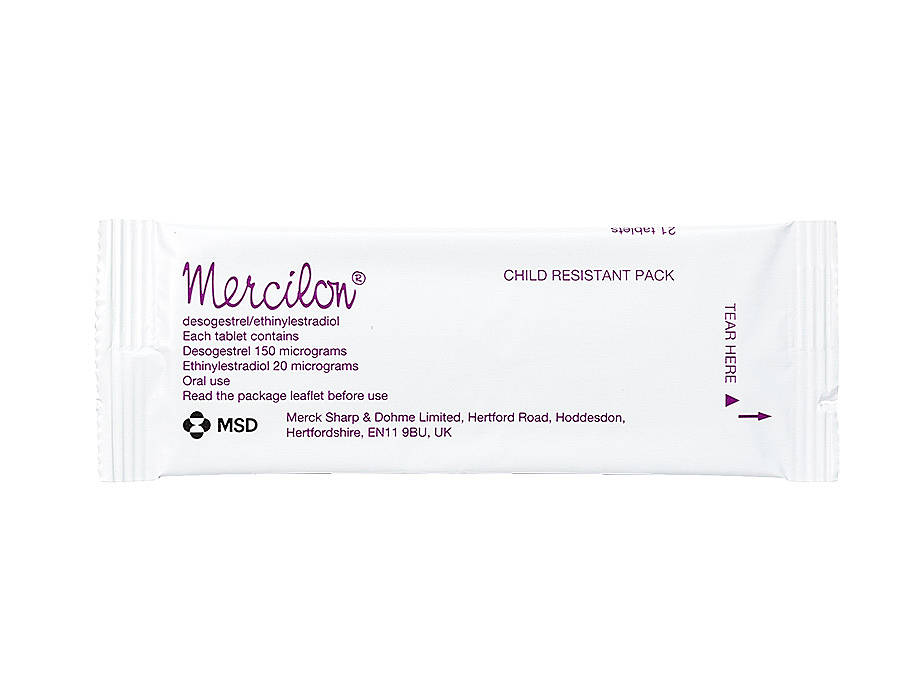Mercilon
Contraceptive Pill with Ethinylestradiol and Desogestrel




Mercilon is a frequently prescribed combined oral contraceptive pill with the active ingredients ethinylestradiol and desogestrel. We offer a convenient prescription service for women who use this pill: To place a prescription order, fill in our brief questionnaire. You can choose a preferred treatment, such as Mercilon.
One of our doctors will check if the contraception is suitable for you and issue your prescription to a local pharmacy in Ireland or your home address. Alternatively, you can choose to have your medication delivered directly to your door. A consultation for the contraceptive pill prescription costs €21.50.



About Mercilon
-
-
Mercilon is a combined contraceptive pill which contains 2 synthetic hormones, ethinylestradiol and desogestrel. It is an effective form of contraception when used correctly.
-
-
Mercilon contraceptive pill works in 3 ways:
- Mercilon prevents ovulation: It stops an egg from being released from the ovaries, which prevents fertilisation from happening.
- Mercilon increases the thickness of the cervical mucus. This makes it difficult for sperm to enter the womb.
Mercilon also alters the womb lining, making it too thin for an egg to become implanted in the womb, if one was released from the ovaries.
-
-
Like other combined contraceptives, Mercilon can help regulate the menstrual cycle and make periods more predictable. It also helps reduce pain experienced by women when they menstruate. Additionally, Mercilon has been reported to reduce the risk of developing cancer of the ovaries and womb.
-
-
The pill is a very reliable and reversible contraceptive option. If you are taking it correctly, it can offer up to 99% protection from becoming pregnant. As the pill is only hormonal, you can get pregnant again once you stop taking the contraceptive pill.
-
-
Most women who are over 18 and not already pregnant can take the contraceptive pill to prevent pregnancy.
Mercilon is not suitable for all women so you should always discuss contraception options with your doctor first, to find the most suitable one for you. For example, Mercilon is not recommended for smokers over 35 years old, and women with a body mass index (BMI) greater than 35 kg/m2.
-
-
Mercilon needs to be taken daily for 21 days, preferably starting on the first day of your period, followed by 7 pill free days, for a withdrawal bleed phase. For the pill to work, you need to be consistent with taking the pill and follow your doctor’s instructions correctly.
-
-
You should start taking Mercilon on the first day of your period if you can, for 21 days. However, you can start at any point of your cycle as long as you can be sure you’re not pregnant, and use extra contraception (like condoms) for 7 days after starting.
-
-
Any contraception containing oestrogen increases the risk of venous thromboembolism (VTE), that means, for example, of deep vein thrombosis. Studies suggest that the risk of developing VTE rises 2- to 5-fold for women who use combined oral contraceptive pills (COCs), compared to women who do not use COCs. Progesterone only pills (POPs) do not increase the risk of VTE.
As Mercilon contains the least oestrogen dose of the COCs, the risk of VTE is less compared to taking other combined oral contraceptive pills.
-
-
No. There is no increased risk of heart attack (myocardial infarction) when using low dose oestrogen combined oral contraceptive pills, such as Mercilon.
-
-
No. Mercilon does not cause weight gain. The modern combined oral contraceptives (COCs) such as Marvelon, Mercilon, and Cerazette offered by ZAVA, contain reduced levels of progesterone, and the type of progesterone used (Desogestrel) is more targeted and does not have the side effect of weight gain.
-
-
There are no food or drink interactions that affect the effectiveness of using Mercilon. However, it is advisable to always eat a healthy diet to maintain a healthy body.
-
-
There is no interaction between taking Mercilon and alcohol. However, it is advisable to always drink responsibly, within the recommended units of alcohol per week.
-
-
Yes, if you’re at risk of contracting an STI. Contraceptive pills like Mercilon do not protect you from STIs (sexually transmitted infections). In these cases you will need to also use a condom.
-
-
After taking the pill for 21 days, there is a 7-day pill free period during which you will have a “withdrawal” bleed. This is perfectly normal and shows the contraceptive is working as it should. If you miss one of these withdrawal bleeds but have taken your pills correctly, it is unlikely you are pregnant. However, if you keep missing withdrawal bleeds, you should do a pregnancy test.
-
-
A standard Mercilon pill contains 150 mg desogestrel and 20 mg ethinylestradiol. You should take 1 pill per day preferably at the same time every day to make sure you don’t miss a dose. Mercilon can be taken with or without food.
If you realise you have missed a pill late in the day, just resume your medication the next day. You will still be protected. However, if you miss 2 or more doses, the pill becomes ineffective and you could get pregnant. You should seek advice from your doctor and use additional contraception such as condoms.
Vomiting up to 3 hours, or having diarrhoea up to 12 hours, after taking the pill may mean you are not fully protected. You should take another pill afterwards and seek advice from your doctor.
You should take Mercilon for 21 days, starting on the first day of your period, followed by 7 days without taking the pill. During the 7-day pill free phase, you will have a withdrawal bleed which shows your body is responding to the contraceptive. Mercilon is usually provided in “strips” of 21, making it easier for you to remember when to take the pill.
If you still have a withdrawal bleed after the 7-day pill free period, you must still resume taking Mercilon on the 8th day for the next 21 days to ensure full protection.
If you take more Mercilon than your prescribed dose, this will not improve your protection. It won’t harm you either but may make you feel nauseous or experience vaginal bleeding.
-
-
Mercilon tablets contain the active ingredients ethinylestradiol (20 mg) and desogestrel (150 mg). Mercilon tablets also contain dl-alpha-tocopherol, potato starch, povidone, stearic acid, aerosil and lactose. If you are allergic to any of these ingredients you should not take Mercilon.
-
-
What a doctor may do before you start taking Mercilon:
- take your blood pressure
- ask questions about your family’s medical history
- examine your breasts
While you are taking Mercilon you need to:
- have regular check-ups with your doctor
- have regular cervical smear tests
- check your breasts for changes, lumps and dimpling of the skin regularly
- tell your doctor if you are taking Mercilon and need a blood test
- tell your doctor if you are on Mercilon before an operation – you may need to stop your contraceptive treatment 4-6 weeks before an operation to reduce the risk of blood clots
-
-
- migraine/headache
- sore breasts/nipple discharge
- depression/mood changes
- increased blood pressure
- gynaecological and vaginal problems: fibroids/endometriosis (womb disorders), fungal infections like thrush and changes in secretions
- rashes/brown patches on the skin may occasionally occur
- nausea/vomiting
- eye discomfort
- gallstones
- chorea (jerky movements)
- systemic lupus erythematosus (causes joint ache and tiredness)
The following side effects are severe, and you must see a doctor immediately if you experience symptoms of any of the following:
- signs of a blood clot (painful swelling of the leg, chest pains, laboured breathing)
- heart attack/stroke (severe migraine, blurred/loss of vision, dizziness, fainting, seizures, weakness or numbness on one side of the body, slurred speech, sharp chest or stomach pains)
- severe allergic reactions (swollen face, lips, mouth, tongue or throat)
- signs of breast cancer – as with all oral hormonal contraceptives, there is a slight increase (0.3%) in the risk of breast cancer (dimpling of the skin, changes to the nipple, visible or tangible lumps in the breast tissue)
- signs of cervical cancer – a possible slight increase in the risk of cervical cancer is associated with all the combined contraceptives (vaginal discharge containing blood, vaginal bleeding, pelvic pain, painful sex)
- severe liver problems – a possible slight increase in the risk of liver problems is associated with all the combined contraceptives (upper abdomen pain, jaundice-yellow eyes and skin)
-
-
Mercilon may slightly increase your risk of having a blood clot, particularly during the first year of taking the pill. Blood clots in the vein may become serious if the clot moves into the lungs, causing chest pains, breathlessness, collapse and even death.
Women who take Mercilon have a slight increase in the risk of having a blood clot compared to women who don’t take the pill. The chances of having a blood clot when taking Mercilon is quite rare. Your lifestyle and other health factors, such as smoking and obesity, may be more likely to determine your risk of a blood clot.
Please also note:
- Mercilon may also slightly increase the risk of developing cancer of the cervix and cancer of the breast.
- You should take regular smear tests to check for early symptoms of cervical cancer.
- You should not take Mercilon if you have or have had breast cancer or have a family history of breast cancer.
- You should see your doctor immediately if you notice any changes in your breasts.
-
-
- are pregnant/breastfeeding
- have/have had breast cancer
- have unexplained vaginal bleeding
- have/have had severe liver disease
- are allergic to any of the ingredients in Mercilon
- had the following conditions while pregnant or on steroids: jaundice, blister-like rash, hearing problems or systemic lupus erythematosus
- are over 50
- are a heavy smoker (more than 40 a day)
- if anyone in your close family has had problems with their circulation (including blood clots, heart attacks or strokes)
You should tell your doctor if you have any of the conditions above before taking Mercilon. Some health conditions may mean that Mercilon is less suitable for you, but may still be able to use it.
-
-
- have had heart or circulation problems (especially blood clots)
- have inflammatory bowel disease or ulcerative colitis
- have sickle cell anaemia
- have diabetes
- have excessive thickening of the womb lining (endometriosis)
- have had gynaecological problems like fibroids
- have had kidney/liver problems or gallstones
- have had severe depression
- have/have had epilepsy/migraines
- have brown patches on your body/face (chloasma)
- smoke
- have taken sex steroids before
- have high blood pressure
- have high blood cholesterol or a family history of that
- have gallstones
-
-
- epilepsy treatments
- some sedatives (barbiturates)
- St John’s Wort (herbal remedy)
- griseofulvin (antifungal)
- some laxatives/medical charcoal
Mercilon can also affect how well other medicines work, for example, diabetes medications. You should speak to your doctor if you are taking any other medication while on Mercilon.

Babak studied medicine at King’s College London and graduated in 2003, having also gained a bachelor’s degree in Physiology during his time there. He completed his general practice (GP) training in East London, where he worked for a number of years as a partner at a large inner-city GP practice. He completed the Royal College of GPs membership exam in 2007.
Meet our doctorsLast reviewed: 06 Jun 2023
